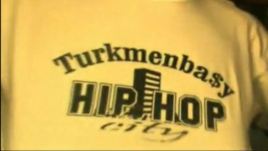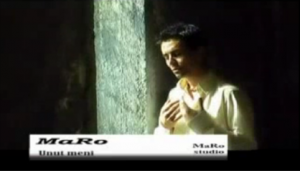Yo! Turkmen Rappers Flip the Script on Repression
by Radio Free Europe / March 6, 2012 / No comments

Production and distribution of rap music is not officially banned, but it's clear that rappers have to watch their step.
Open your eyes, look in the mirror / Look at your surroundings / Do not stop, wake up / Enough is enough.”
These rap lyrics might not jump out as “gangsta” — that is, if you’re expecting profanity-laced rants and explicit calls for social and political change.
But in Turkmenistan, one of the world’s most closed and oppressive societies, even such carefully couched words appealing for change can be seen as a direct threat to the country’s authoritarian regime and can lead to time in the joint.
The threat of prison, however, has not slowed the rising number and popularity of Turkmen rap groups defying government restrictions in Turkmenistan.
Production and distribution of rap music is not officially banned. But as evidenced by punishments handed down against those who crossed the line, it is clear that rappers have to watch their step.
Many rap groups are finding new ways of spreading their message, with many opting to record their music in secret and share their music through YouTube and mobile-phone applications.
Other groups risk the authorities’ wrath by recording their songs in music studios, which are officially only allowed to record state-approved music.
Taher Shir Mohammadi, a Turkmen journalist living in Germany, says that for young people in Turkmenistan, rap music is a way to express their opposition to government repression and the daily hardships they endure.
“Turkmen rappers sing songs about political issues and social problems, generally about youth life, such as unemployment, drug addiction, and restrictions,” Mohammadi says. “They care about it, but they cannot freely voice their political opinions due to the repressive political circumstances in Turkmenistan.”
A ‘Criminal Family’
The dangers and official constraints facing Turkmen rappers is epitomized by the arrest and imprisonment of one of the country’s leading rap artists in 2011.
Details are sketchy. But according to unofficial reports, Maksat Kakabayev, better-known by his stage name, Maro, was arrested in the capital, Ashgabat, in January last year and given an initial 15 days of temporary detention.
Maro was later sentenced to two years in jail and was soon joined by his father, brother, and even his brother-in-law.
Authorities have never given an official explanation as to why Maro was arrested and jailed. But Turkmen journalists like Mohammadi say the arrest has to do with Maro’s music, which unlike the state-approved brand of Turkmen ethno-pop, has ideological overtones.
One of Maro’s songs, in particular, is widely believed to have triggered the displeasure of authorities. His song, “Wake Up, Wake Up!”, some say, was interpreted by the government as a call for Turkmen to stand up against the regime.
“Everyone is born to be examined / Do not lose the opportunity / Never lose yourself. Believe in yourself / Otherwise, it might be too late. / Wake up, wake up!”
Against The ‘Turkmen Mentality’
Maro’s case was not the first time musicians have gotten into hot water with the authorities in Turkmenistan.
The country’s previous president, Saparmurat Niyazov, banned nearly all forms of Western art, insisting that they were at odds with the “Turkmen mentality,” according to the opposition website Gundogar.
The website adds: “President Niyazov was a champion of such bans. He signed a decree in 2001 banning opera, ballet, the circus, and a variety of other stage acts.”
Niyazov’s death in 2006 and the appointment of his successor and current president, Gurbanguly Berdymukhammedov, raised hopes that things might change for the country’s musicians and artists.
But that hope was dashed after the president issued a series of decrees, including one requiring female performers to wear traditional Turkmen dress on stage rather than Western garments.
RFE/RL’s Turkmen Service contributed to this story
This article was originally published on February 13, 2012 by Radio Free Europe/Radio Liberty.
Copyright (c) 2011. RFE/RL, Inc. Reprinted with the permission of Radio Free Europe/Radio Liberty, 1201 Connecticut Ave., N.W. Washington DC 20036.





